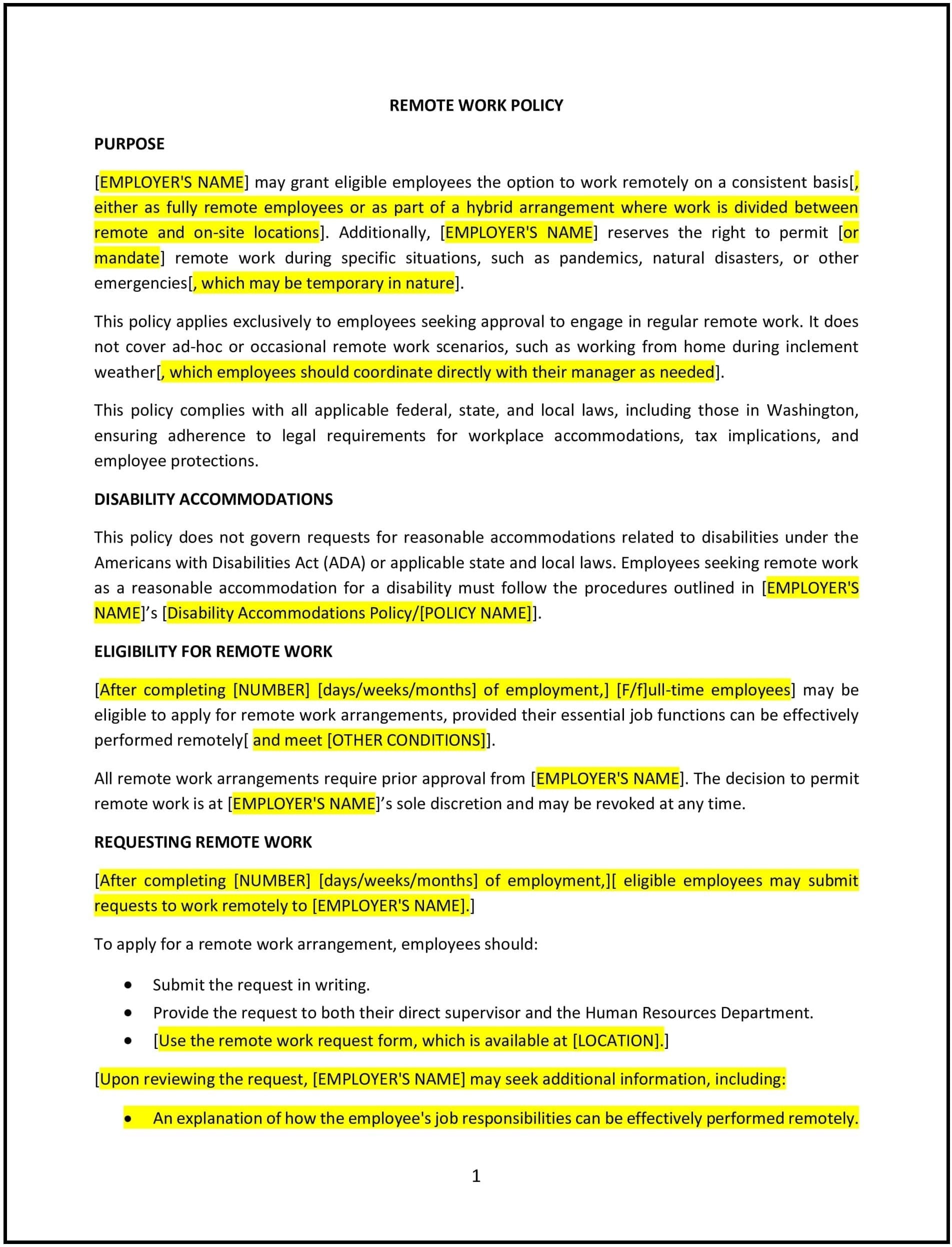Got contracts to review? While you're here for policies, let Cobrief make contract review effortless—start your free review now.

Customize this template for free
This remote work policy is designed to help Washington businesses manage and regulate remote work arrangements. The policy outlines the expectations, responsibilities, and guidelines for employees who work remotely, including communication protocols, performance expectations, and the use of company resources. It ensures that remote work is structured in a way that supports both business objectives and employee needs, while complying with Washington state laws and federal regulations.
By adopting this policy, businesses can provide flexible work options to employees while maintaining productivity, fostering work-life balance, and supporting legal compliance.
How to use this remote work policy (Washington)
- Define eligibility for remote work: The policy should specify which employees are eligible to work remotely, including any criteria such as job responsibilities, performance standards, or tenure with the company. It should also outline any exceptions or specific circumstances that may allow or prevent remote work.
- Set expectations for work hours and availability: The policy should define the expected working hours for remote employees, including whether employees are required to work during standard business hours or if they have flexibility. It should also specify availability expectations for meetings, communication, and collaboration with team members.
- Establish communication guidelines: The policy should outline the preferred methods of communication for remote employees, including email, video conferencing, and instant messaging. It should establish expectations for how often employees should check in with their manager or team and how they should report progress on tasks.
- Provide guidelines for remote work environment: The policy should specify the requirements for employees' remote work setup, including guidelines on ergonomics, safety, and equipment (e.g., computers, internet connections). It may also outline whether the company will provide or reimburse for certain work-related expenses, such as office supplies or software.
- Address performance management: The policy should establish clear expectations for performance, including how performance will be measured, how remote employees should track their work, and how feedback will be provided. The policy should ensure that remote work does not affect the company’s ability to assess employee performance and progress.
- Specify security and confidentiality: The policy should address how employees should handle company data and information when working remotely, ensuring that all sensitive information is protected. It should outline the security protocols, such as the use of encrypted connections, secure passwords, and virtual private networks (VPNs), to prevent unauthorized access.
- Ensure compliance with Washington and federal laws: The policy should comply with Washington state laws and federal regulations regarding remote work, including laws on employee compensation, overtime, and safety. It should ensure that remote employees are compensated fairly and that their rights are protected while working remotely.
- Review and update regularly: Periodically review and update the policy to ensure it remains compliant with Washington state laws, federal regulations, and any changes in company operations. Regular updates will help ensure the policy stays relevant and effective.
Benefits of using this remote work policy (Washington)
This policy offers several benefits for Washington businesses:
- Promotes work-life balance: By offering remote work options, businesses can help employees achieve a better work-life balance, improving employee satisfaction and well-being.
- Increases flexibility: The policy gives employees flexibility to work from home or other locations, which can improve morale and reduce stress while maintaining productivity.
- Reduces overhead costs: Remote work can help businesses reduce overhead costs, such as office space, utilities, and equipment, while maintaining the same level of output.
- Enhances employee retention: Offering remote work as a benefit can improve employee retention, particularly among employees who value flexibility in their work arrangements.
- Improve compliance with legal requirements: The policy helps businesses comply with Washington state and federal laws related to remote work, reducing the risk of legal issues or penalties.
- Supports business continuity: By providing remote work options, businesses can continue operations in the event of disruptions, such as severe weather, health crises, or other emergencies, without sacrificing productivity.
Tips for using this remote work policy (Washington)
- Communicate the policy clearly: Ensure all employees understand the remote work policy and how it applies to their work. Include the policy in the employee handbook, review it during onboarding, and provide periodic reminders.
- Monitor performance and productivity: Managers should regularly monitor remote employees' performance and productivity to ensure that remote work does not negatively affect business operations. Clear performance metrics and regular check-ins can help keep remote employees on track.
- Provide the necessary tools and resources: Ensure that remote employees have the tools, resources, and support they need to do their jobs effectively. This may include providing access to necessary software, hardware, or training to work from home.
- Address communication challenges: Remote work can create communication challenges, so the policy should establish regular check-ins, team meetings, and clear communication guidelines to help employees stay connected with their team and manager.
- Foster a sense of connection: Encourage remote employees to stay engaged with their colleagues through virtual meetings, social events, or team-building activities. Creating a strong sense of community can help combat isolation and promote teamwork.
- Review and update regularly: Periodically review the policy to ensure it remains compliant with Washington state laws, federal regulations, and any changes in the company’s operations. Regular updates will help keep the policy relevant and effective.